(While you will get the gist of this blog in the text a much fuller understanding will come from reading the embedded articles). In a letter dated 18 May 2012, the Ministry of Health wrote:
The pertussis containing vaccines are effective but do not protect all babies. The pertussis vaccine currently used in New Zealand and other developed countries offers protection of around 84 percent after three doses….. Adult immunisation is recommended for those who have contact with babies or someone who has an underlying respiratory condition.
Pertussis incidence and mortality have declined in the last 50 years in many places around the world mainly as a result of immunisation activities. However, the incidence of pertussis disease has increased in countries where pertussis immunisation rates decreased in the past for example Japan, Sweden and United Kingdom. When immunisation programmes were re-established the rates of disease decreased again.
Has the whooping cough vaccine stopped whooping cough in New Zealand?
No.
Does it work? Every single recent medical article you read on Pertussis will say variations of the following:
Pertussis vaccine protects against serious disease. Pertussis vaccine has reduced deaths markedly. If a vaccinated person gets pertussis it will be mild. On that basis, no vaccinated child should land up in hospital, right? Yet, in this country, vaccinated children landing up in hospital has been happening for years.
If whooping cough medical articles don't contain those sentiments, they won't get published, because the words "protect, safe and effective" are the only words that matter to the provaccine. Even if those words are creating a false illusion.
You be the judge. Check out the links, and the full sources. Don't forget that no matter how bad the graphs look, or how much any medical article shows that the NZ vaccines don't work, the "cause" of that was and will always be that parents are:
1) vaccinating babies too late.
2) not vaccinating their children.
3) not using enough boosters.
As Cullen 96 says:

In the years 1972 - 1929, Mortality decline (death rate per million) from whooping cough as published in the Appendices to Parliamentary Journals 1930.... looks like this (Pdf). Pretty impressive, huh?
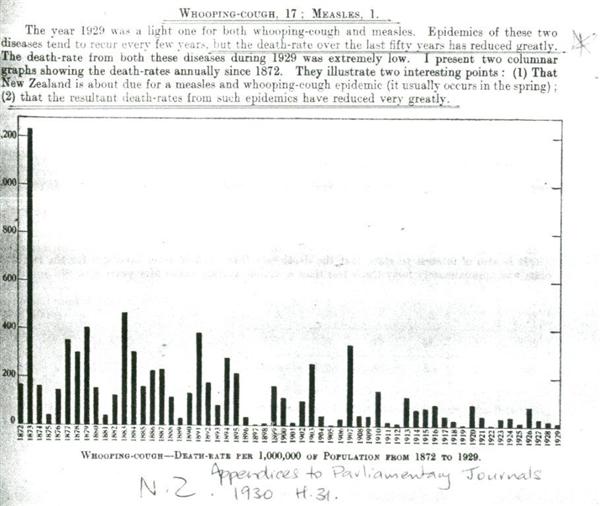
There wasn't vaccines to do that, and neither were there antibiotics. Just.... wait for it - improvements in nutrition and living conditions, or at least...so thought the Director General of Health in 1932, when he waxed lyrical about how sanitation and nutrition improvements had resulted in huge declines in all infectious diseases since 1872.
And even later when you look at this table which was published before antibiotics came to be available, you cannot attribute any of that to vaccines, can you?
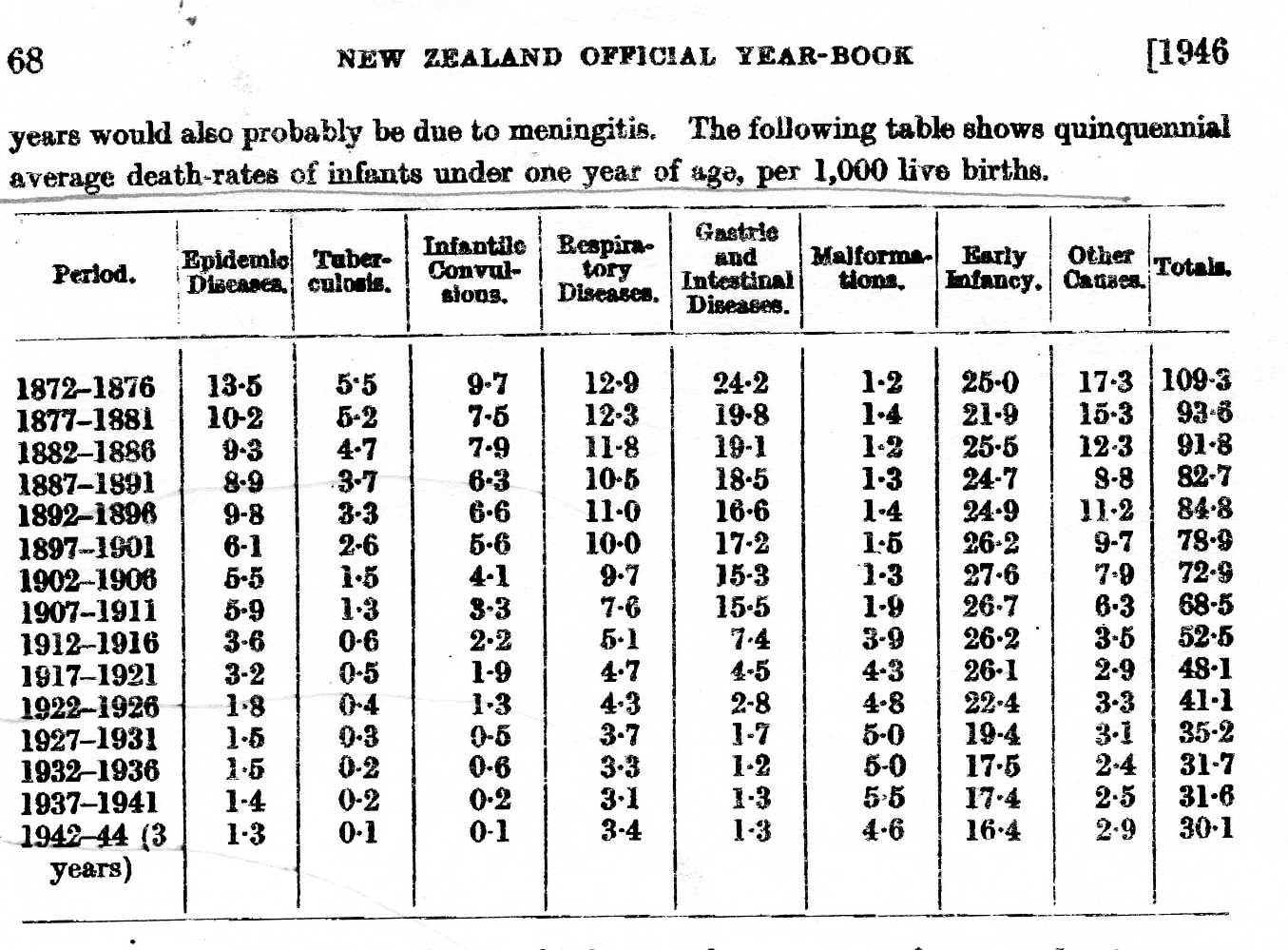
So because deaths for all infectious diseases declined before any treatment, the success of the whooping cough vaccine can't be measured in death decline, because deaths had dropped to rock bottom before the introduction of the vaccine. So what measure can we use? Becasue whooping cough was not notifiable, the only legitimate historical measure of "progress" is annual pertussis hospital discharge rates. In a New Zealand Medical Journal article dated 2010, Professor Grant put in this graph. (The pink addition is mine, and the pertussis vaccine data was mined from the Official year books in Auckland Public library's History room):
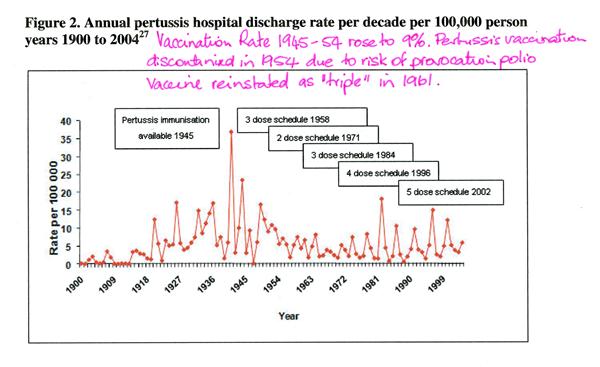
So the whooping cough vaccine has been used consistently since 1961 - 51 years now. New Zealand Medical Journal 1995, includes this 1920 - 1990 graph:
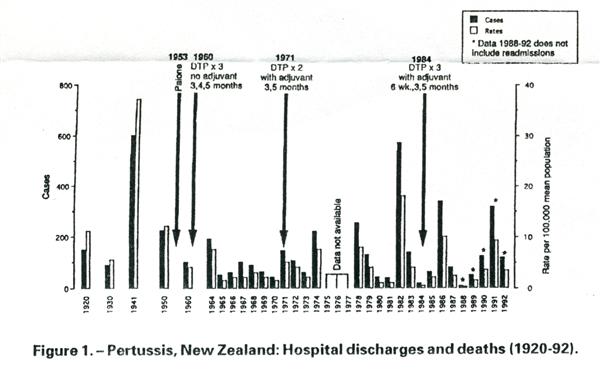
Does this look like progress? New Zealand Family Physician, 1997, had these two graphs:
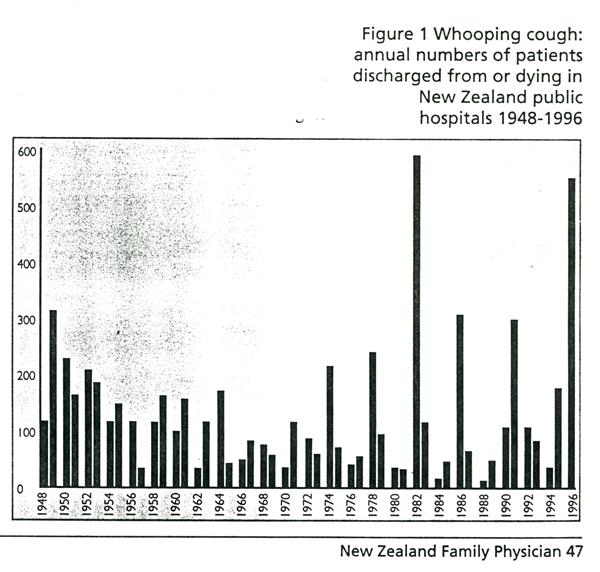 This second graph, from the same article shows an eight-fold INCREASE in hospital admissions for babies between 1878 and 1996 (I will discuss that Whooping cough - Immunity):
This second graph, from the same article shows an eight-fold INCREASE in hospital admissions for babies between 1878 and 1996 (I will discuss that Whooping cough - Immunity):
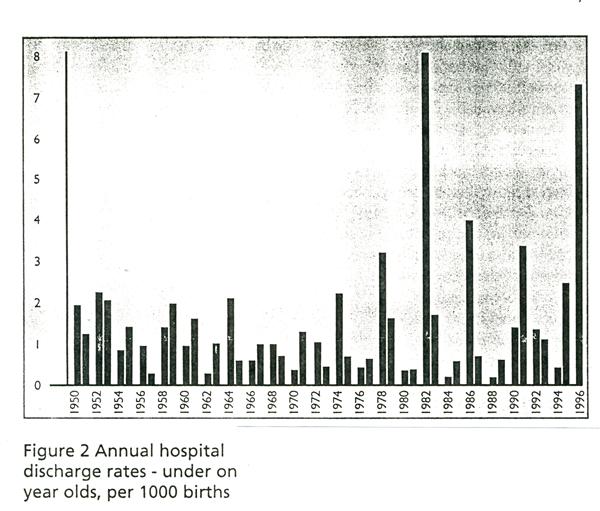
So what happened in that dippy bit between 1964 and 1974? My guess? Well, having used a vaccine, doctors had the attitude that "pertussis won't exist any more", so doctors didn't "see" it. However, those dealing with the statistics could see the problem. In December 1987, Dr Don Bandaranayake printed this graph in the CDNZ monthly bulletin:
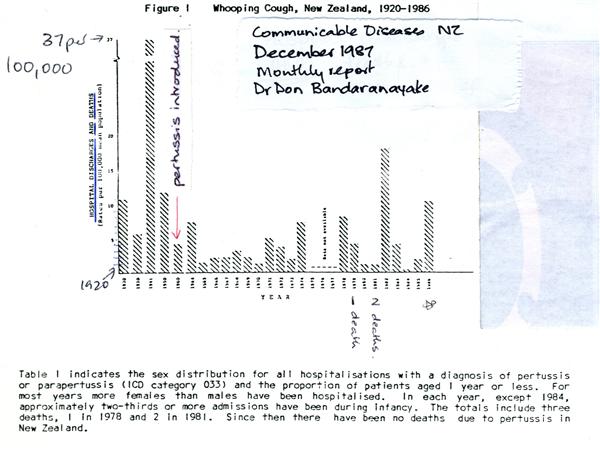
Dr Bandaranayake also wrote above the graph: "Except for the period from 1965 to 1971, these rates do not compare favourable with rates obtained in the pre-immunisation period'.
Whereas today, we are always being told that not enough people are being vaccinated against pertussis on time..., back in those days there was an expectation that a vaccine would work in the individuals in which it was injected, and reduce total numbers of the sick.... regardless as to how many people were vaccinated.
The Ministry of Health decided to add a third shot in 1984, a fourth in 1996, and a fifth in 2002, and in 2006, one booster was shifted to the 11 year old group. Another article detailing New Zealand history is 2007 Sommerville which is worth reading for all it's excuses and justifications as well.
So what's happened since 1997. Grant 2010 (NZMJ) had this graph. As you can see, the rates in older age groups above the age of 10 are sky-rocketting:
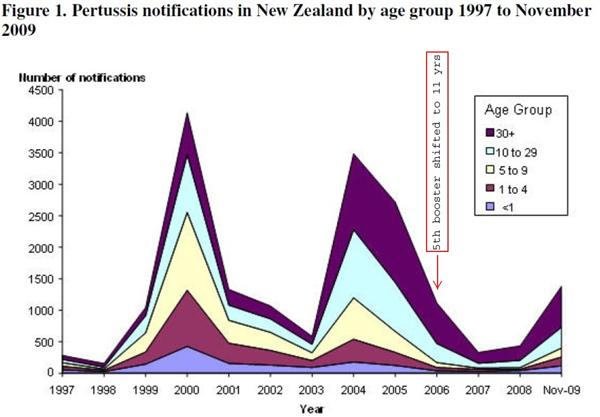
So did we make progress? The 11th May 2012 Public Health Surveillance bulletin, which also gives "known" vaccination status of cases, had this graph which brings us right up to date to May 2012 !:
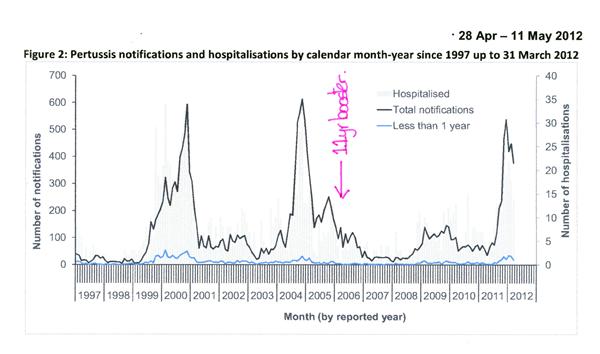
Some vaccine.
How many people in all these epidemics are vaccinated? That data isn't easy to find out, but sometimes, it's possible. Let's just take the 1999 epidemic cases.
Want to know how many cases had known vaccination status and had been vaccinated? This is how many. Note the expansive justifications and excuses. Given that IMAC is now crowing that the under two's have just about met the 95% fully vaccinated goal, such excuses like "an estimated 76% vaccination rate" won't be tenable in the future. And why were they tenable anyway, given that such a large percentage of the sick were "fully" immunised? And such arguments aren't tenable in the Netherlands where over 96% of babies have been vaccinated on time, for over 50 years.
Note that in 2012, the Health Department claims that the vaccine has an 84% effectiveness but wanes with time.
This statement is based on page 141 in the Immunisation handbook which references two studies (Greco 96, Salmaso 2001) using 1992 data which showed that the old whole cell vaccine (Pw) we used to use, had a 36% effectiveness, and the newer aP vaccine all had an 84% effectiveness.
This data is irrelevant, primarily because in the twenty years since that data was collected..., as Australia discovered ,,,,, just as Fine said decades before ...., the vaccine has caused genetic shifts resulting in new strains which are actually more toxic, and which the vaccine gives less protection.While I've seen nothing to confirm this trend in New Zealand, it would seem amazing were it not the case, since it's a problem everywhere else in the world. Worse, 84% aP vaccine efficacy conflicts with the only study (Korobeinikov 2003) done on the current NZ vaccine, which gave it a 33% effective vaccination rate. That study was confirmed by the Public Health Surveillance Unit in 2004.
A 33% effective vaccination rate might also agree with a more recent study by Skerry in 2011 which said:

What confuses the issue, even today, is that most New Zealand doctors rarely recognise whooping cough. Half the time, the doctors don't know that the culture test is just about useless, and they should be doing the PCR test instead, but NEITHER are any use if they've had the person on antibiotics for the previous six weeks for a variety of other "diagnoses"!!!!. Most of the time it is misdiagnosed, very creatively. Viral bronchitis; pseudo pertussis; viral infection;.. and this week I can add two more pearlers - legionnaires and... get this... roseomonas. You can only shake your head in amazement.
Last week, when a mother asked for the PCR test, her doctor looked at her and went, "Huh? What's that for?" When she told him he said, "He doesn't have whooping and even if he did, we use the culture test!". Turned out her child did have whooping cough and wouldn't have had a diagnosis if she had not pressed for one. Mind you, having a diagnosis then opens up another can of worms, called "Whooping Cough - treatment".Medical misinformation, and ignorance surrounding pertussis is considerable, and this situation is common world wide.
Here are two examples of how our own medical newspapers utterly confused doctors in the past. In May 1994, The New Zealand doctor told doctors that:
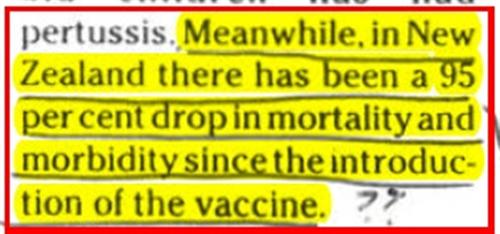
So doctors who read that, would have believed something which wasn't true. You can see that for yourself. Yet in September, those same doctors were told:
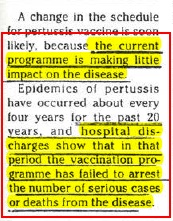
To confuse matters further, a year later, the same publication decided to evaluate Jenkinson 95, which was a landmark article pointing out that the majority of pertussis was nothing like what doctors or parents even thought pertussis was like. Jenkinson pointed out that the majority of pertussis was not diagnosed because it was so mild that neither doctors nor parents believed it was whooping cough, even when tests came back positive.
What did New Zealand doctor come back with, after reading Jenkinson? They said that "the nature of the cough and duration of symptoms was INSUFFICIENT for diagnosis." Unless a doctor had bothered to access and read Jenkinson themselves, they wouldn't have a clue that NZ Doctor had just told them a load of bunk. With "wisdom" like this, who can blame doctors for not having a clue, and feeling that they are incapable of diagnosing whooping cough. Or... for not seeing and reporting whooping cough, because the vaccine has fixed it, just as was happening in the UK in the 60's. Only in 1996, did whooping cough reporting become mandatory here, and that assumes that a doctor even knows what he is seeing.
Jenkinson also pointed out that most patients took considerable convincing to accept that they actually had whooping cough. He inferred that the reason that pertussis was publicly hyped and dramatised as being so serious - and "it will kill!!!"...., was because to do otherwise would "harm" attempts to vaccinate as many people as possible. Which is pretty much what Dr Barrie stated in his medical article entitled "Media Induced Maladies".
As is normal with such an article which swims against the tide of medical opinion, Jenkinson ended by emphasising the publisher's required mantra, stating that "a high immunisation rate is the only practical means of reducing damage and deaths in those too young to be immunised."
Which reminds me of an article published a year before hand, by Siddiqui 94, which listed a raft of very nasty adverse reactions for the pertussis vaccine , and then finished up saying words to the effect that the vaccine was wonderfully safe and effective. When asked why the last sentence, he shrugged and said, "They wouldn't publish it, unless I said that."
In 2006, James Cherry stated this:
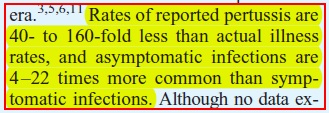
This can be extrapolated to New Zealand, because the same problem exists everywhere there is a whooping cough vaccine. In 1984, Dr Fine had already showed the extent of the non-reporting problem in the UK in the 60's:

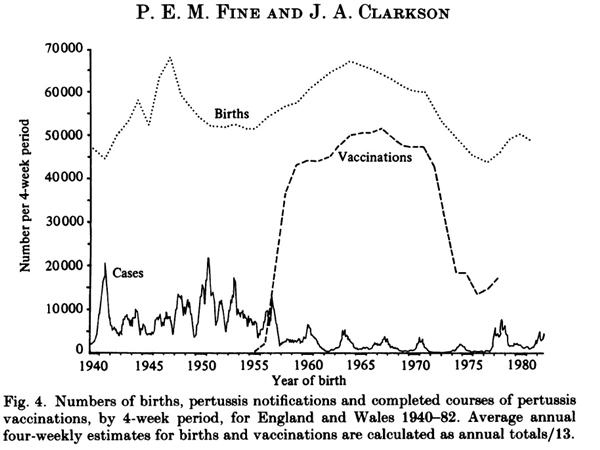
And the drop sure wasn't due to a useful vaccine, because something never told to the public was that the vaccine used in 1969, only had a 20% efficacy rate:

We don't even know what the efficacy was in New Zealand, because the "experts" like Diana Lennon, all quoted efficacy data from the other side of the world. No-one here ever bothered to look despite the fact that our whooping cough rates have never reduced after the introduction of any whooping cough example.
And that's the problem. If you don't look, you won't see. As an example, look at this Norwegian study - 2007 Aase - and see what they found when they actually decided to look and see what happens in Norwegian military recruits. Of considerable interest was that other than one recruit who had undiagnosed whooping cough during basic training, the immunity of the recruits went DOWN during training, because their actual immunity came not from vaccines, but from constant unseen, unnotified exposure circulating in older children in the civilian community, which they were "protected" from, during training. That circulating infection hadn't been noticed before the study, because no-one had bothered to look.
The infection rates we have seen in the past in New Zealand and are seeing in 2012 in terms of actual numbers of reported cases, are not only the tip of the iceberg... the reality of massive under reporting worldwide, begs many questions, like:
1) How correct is historical data? I'd say that hospital discharges might be the only stable guide of whether or not a vaccine is working.
2) How reliable are vaccine efficacy studies in the first place? Not very.
3) Do whooping cough vaccines create herd immunity and prevent epidemics?
This is what the latest PSU report says: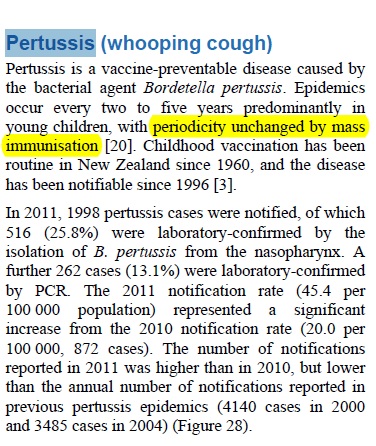
Well, obviously the vaccine have done nothing to curb epidemics, but we know that from all the other graphs, don't we? If pertussis vaccines protected individuals and created herd immunity, only the unvaccinated would be getting whooping cough .
In 2011, of New Zealand pertussis this was the known vaccination rates:
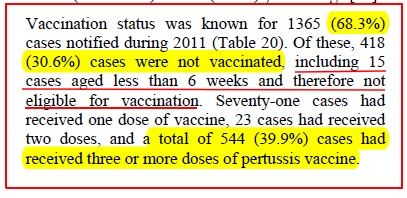
But here's the interesting part. Where the NIR records are complete, up to the 10 years olds, there are very few children listed as "unknown".In the four to ten year olds, 53% of notified pertussis cases had 4-5 doses and 75% were vaccinated…25% were not. An astonishing 589 of 11+ year olds had unknown vaccination histories.

Some of the other questions above have been answered long ago.
Both Cherry 98 and Fine 87 have pointed out the various biases and unscientific nature of whooping cough trials and vaccine efficacy, to the point where if someone asks me how accurate medical literature on whooping cough is, the answer would be that you'd have to try to reconstruct the pile of broken class back into a crystal ball. The medical literature is as clear as mud on just about every aspect of pertussis.
Cameron Grant et al, would love to have on time infant immunisation rates at the right times, for whooping cough Pertussis to be 96% for the next 50 years, - after all, that would eliminate Pertussis wouldn't it?
Not if the very compliant Netherlands experience is anything to go by:
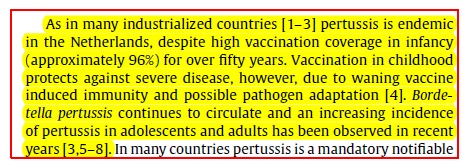
Did you notice, when you read the full texts how every article said, "Vaccination in childhood protects against severe disease"? Believe that if you want, along with all the other supposition. Vaccinate your child if you want. But don't blame the unvaccinated, if your vaccinated child gets whooping cough. Even if you lived in the Netherlands, what we have in New Zealand, would be your lot as well.



